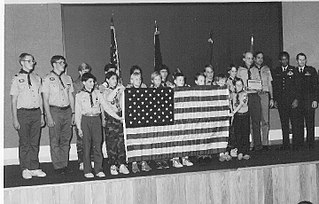
Scouting in Colorado has a long history, from the 1910s to the present day, serving thousands of youth in programs that suit the rugged, mountainous environment in which they live.

Mae Carol Jemison is an American engineer, physician, and former NASA astronaut. She became the first black woman to travel into space when she served as a mission specialist aboard the Space Shuttle Endeavour. Jemison joined NASA's astronaut corps in 1987 and was selected to serve for the STS-47 mission, during which she orbited the Earth for nearly eight days on September 12–20, 1992.

Frances Wisebart Jacobs was born in Harrodsburg, Kentucky, to Jewish Bavarian immigrants and raised in Cincinnati, Ohio. She married Abraham Jacobs, the partner of her brother Jacob, and came west with him to Colorado where Wisebart and Jacobs had established businesses in Denver and Central City. In Denver, Frances Jacobs became a driving force for the city's charitable organizations and activities, with national exposure. Among the philanthropical organizations she founded, she is best remembered as a founder of the United Way and the Denver's Jewish Hospital Association.
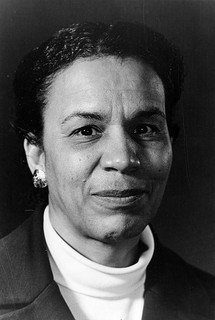
Rachel Bassette Noel was an American educator, politician and civil rights leader in Denver, Colorado. She is known for the "Noel Resolution", a 1968 plan to integrate the Denver city school district, and her work to implement that plan, as well as other work on civil rights. When elected to the Denver Public Schools Board of Education in 1965, Noel was the first African-American woman elected to public office in Colorado. In 1996, Noel was inducted into the Colorado Women's Hall of Fame.
Mary Lou Makepeace is an American politician who served as the mayor of Colorado Springs, Colorado from 1997 to 2003. She was the first woman to hold that position.

Pikes Peak is the highest summit of the southern Front Range of the Rocky Mountains, in North America. The ultra-prominent 14,115-foot (4,302.31 m) fourteener is located in Pike National Forest, 12 miles (19 km) west of downtown Colorado Springs, Colorado. The mountain is named in honor of American explorer Zebulon Pike. The summit is higher than any point in the United States east of its longitude.

The Colorado Women's Hall of Fame is a non-profit, volunteer organization that recognizes women who have contributed to the history of the U.S. state of Colorado. As of 2020, 170 women have been inducted.
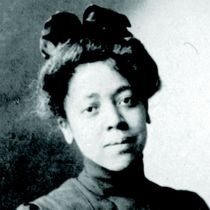
Justina Laurena Ford was an American physician. She was the first licensed African American female doctor in Denver, Colorado, and practiced gynecology, obstetrics, and pediatrics from her home for half a century.

Elizabeth Piper Ensley, was an educator and an African-American suffragist. Born in Massachusetts, Ensley was a teacher on the eastern coast of the country. She moved to Colorado where she achieved prominence as a leader in the Colorado suffrage movement. She was also a journalist, activist, and a leader and founder of local women's clubs.
Gloria Travis Tanner is a former United States politician and public figure. In 1994 she became the first African American woman to serve as a Colorado state senator. In 2000 she founded a leadership and training institute for black women in Colorado. She was inducted into the Colorado Women's Hall of Fame in 2002.
Edwina Hume Fallis was an American educator, writer, poet, and toy designer. Her memoir for children, When Denver and I Were Young (1956), went through two printings, and she published over 100 poems. She was posthumously inducted into the Colorado Women's Hall of Fame in 1989.

Sarah Sophia Chase Platt-Decker was an American suffragist. Mostly active in Denver, Colorado, she also served as the national president of the Federation of Associated Women's Clubs from 1904 to 1908.

Genevieve Fiore (1912–2002) was an American women's rights and peace activist, who was the founder, and served as the executive director, of the Colorado Division of United Nations Educational, Scientific and Cultural Organization (UNESCO). Her UNESCO Club was founded in the year the clubs were first conceived and was the third organization established in the world. In 1967 she was honored as one of the inductees for the Colorado Women of Achievement Award. She was knighted by Italy in 1975 receiving the rank of Cavaliere dell'Ordine della Stella d'Italia. In 1991, she was inducted into the Colorado Women's Hall of Fame for her many years of peace activism and work with women's rights issues.
Joan Packard Birkland was an American athlete and women's sports advocate. Considered one of Colorado's greatest all-around athletes, she earned multiple titles in women's amateur tennis and golf championships at the city and state level. Following her retirement from competition, she served on numerous sports boards and became involved in sports education for disabled youth. She was inducted into the Colorado Golf Hall of Fame in 1977, the Colorado Sports Hall of Fame in 1981, and the Colorado Women's Hall of Fame in 1996.
Gudrun "Gudy" Gaskill was an American mountaineer who is regarded as the driving force behind the creation of the Colorado Trail, a 567-mile (912 km) hiking, biking, and horseback riding path between Denver and Durango, Colorado. Beginning in the 1970s, she helped plan out the route, solicited donations, and recruited teams of volunteers to work in one-week shifts developing the Trail each summer. She was named executive director of the newly formed Colorado Trail Foundation in 1987. She was inducted into the Colorado Women's Hall of Fame in 2002.
Fannie Eller Lorber was a Russian-born philanthropist and community activist. She founded the Denver Sheltering Home for Jewish Children, later known as the National Home for Jewish Children.
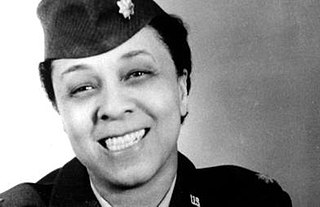
Oleta Lawanda Crain was an African-American military officer, federal civil servant, and advocate for black women's rights and desegregation. Out of 300 women nationwide who entered officer training in the U.S. military in 1943, she was one of the three African Americans. She served in the United States Air Force for 20 years, retiring with the rank of major. In 1964 she began working for the United States Department of Labor in Washington, D.C., becoming regional administrator of its Women's Bureau in Denver, Colorado, in 1984. She traveled and spoke extensively to women about employment rights, wages, and career opportunities. She received numerous awards and honors, and was inducted into the Colorado Women's Hall of Fame in 1988.
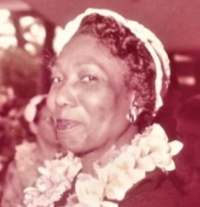
Pauline Short Robinson (1915–1997) was an American librarian and civil rights activist. She was the first African American to be hired as a librarian in the city of Denver, Colorado. During her 36-year career with the Denver Public Library system, she worked in several branches and served as Coordinator of Children Services for 15 years. In 1996 the Denver Public Library named a newly built branch in Northeast Park Hill in her honor. She was posthumously inducted into the Colorado Women's Hall of Fame in 2000.

History of slavery in Colorado began centuries before Colorado achieved statehood when Spanish colonists of Santa Fe de Nuevo México (1598–1848) enslaved Native Americans, called Genízaros. Southern Colorado was part of the Spanish territory until 1848. Comanche and Utes raided villages of other indigenous people and enslaved them.
Arie Parks Taylor was the first African American woman to become a Women in the Air Force classroom instructor and officer and the first African-American woman elected to the Colorado State House of Representatives.












